SUCCESS STORY
Alan Delabie:
A Dynamic Path from European Champion to Hollywood Director
By Guillaume Jean Lefebvre
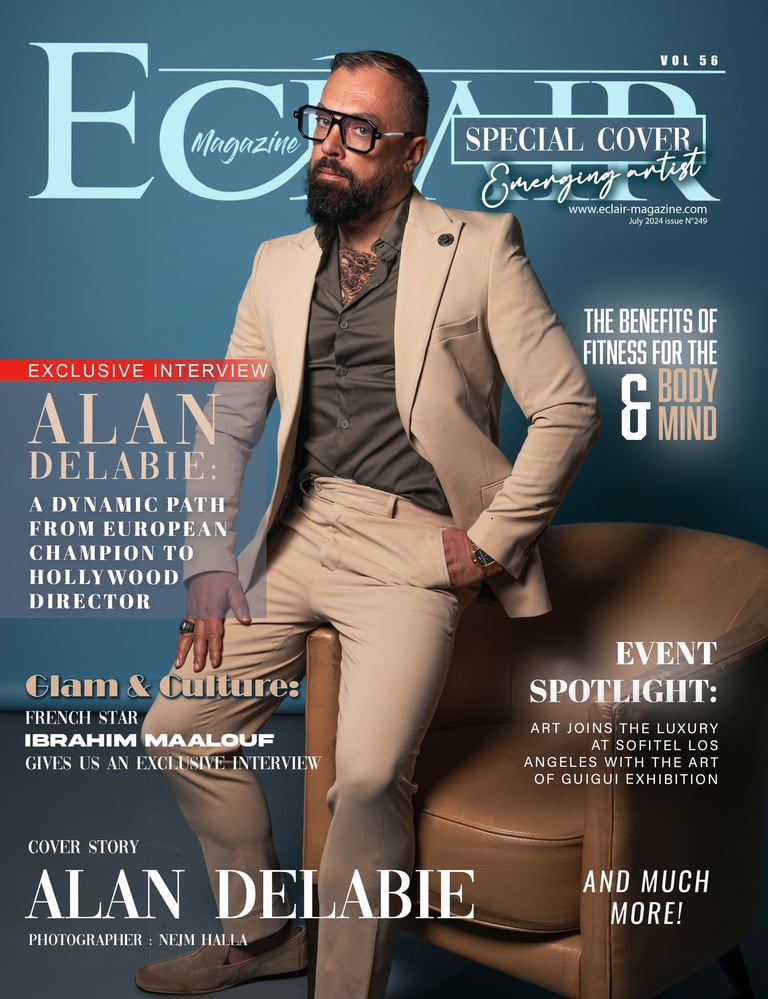

Alan Delabie, of French origin, was born in the north of France and grew up in the vibrant city of Lille. From a young age, Alan harbored dreams of becoming an actor, deeply inspired by martial arts legends like Bruce Lee, and iconic actors such as Charlton Heston, Robert De Niro, and Jack Nicholson. Horror movies, particularly "The Howling" by Joe Dante and "An American Werewolf in London" by John Landis, also left a significant imprint on his childhood.
His journey into martial arts began early, leading to a profound transformation in his life. Alan excelled in nunchaku demonstrations, eventually becoming the European champion in this discipline. This achievement brought him recognition through various TV shows and paved the way for his entry into the artistic world.
Despite studying commercial sales, Alan quickly found his true calling in performing arts. His professional career is marked by key moments, including directing major Hollywood actors like Eric Roberts and Bob Wall, Bruce Lee's opponent in "Enter the Dragon." These experiences bolstered his confidence and opened doors to further opportunities. Notably, he directed Don "The Dragon" Wilson and Lee Arenberg, famed for his role in "Pirates of the Caribbean."
Alan adopts a disciplined and proactive approach to his work, embodying the philosophy of never putting off until tomorrow what can be done today. This relentless drive has led to significant professional achievements, including the co-direction of the feature film "Borrowed Time 3: Falling Apart" with David Worth, the director of "Kickboxer" starring Jean-Claude Van Damme. The "Borrowed Time" trilogy, featuring prominent actors such as Costas and Louis Mandylor, Eric Roberts, Matthias Hues, and Merrick McCartha, is a testament to his storytelling prowess and directorial skill.
Balancing his professional and personal life with strict boundaries, Alan maintains a clear separation between the two, emphasizing the importance of keeping a foot in reality. Looking ahead, he is immersed in filming the sequel to "Shepherd Code" titled "Shepherd Code 2: Road Back," with shoots in Portugal and London. He also recently acted in the Christmas feature film "3 Wishes for Christmas," adding another feather to his cap.
Driven by ambition, Alan aims to produce a film with a major studio or Netflix, confident in his abilities to achieve this goal. Through his journey, he aspires to be perceived as a passionate individual and a fighter who shares his love for his craft with others.
BIOGRAPHY
Your journey from martial arts to acting is quite unique. How did your martial arts background influence your approach to acting and filmmaking?
Seeing Bruce Lee in the cinema gave me the idea to explore this niche. When I started practicing karate, I already had this dream of becoming an actor. But for a young child from France, reaching Hollywood seemed impossible. Martial arts taught me the discipline and rigor I needed to pursue my dream and develop a strategy. I knew my destiny was linked to being an artist.
You mentioned being inspired by Bruce Lee and other iconic actors. How have these influences shaped your artistic vision and the types of projects you pursue?
Initially, Bruce Lee opened the path to my dreams. Then, another European, JC Van Damme, achieved what I had dreamed of. With maturity, I opened up to a broader range of cinema: thriller, horror, action, drama. Although fantasy and horror were a big part of my adolescence, my films have a nostalgia for that era while maintaining modernity. The past blends with the future. Actors like De Niro, Pacino, Angela Bassett, Clint Eastwood, and Denzel Washington have greatly influenced me. In France, I stayed old school with Alain Delon, Gabin, and Ventura, although today we have some good French actors, I am much more international.Your early television appearances in France and Belgium helped to launch your career. What were the key lessons you learned from these experiences that you still apply today?
It was live, so there was no room for error. It taught me to be comfortable in front of the camera, to concentrate, to get straight to the point, and to be confident. These experiences helped shape who I am today.Transitioning to the American entertainment industry can be challenging. What were the biggest obstacles you faced when you moved to North America, and how did you overcome them?
It's always a challenge when your native language isn't English. It's a barrier, but ultimately a very stimulating one. I had to work hard to overcome this challenge.
International actor: Alan Delabie - @alandelabie
Photographer : Nejm Halla - @michelpatoulatchi
Suit, Shirt & Jean: Frankie's men store
wine : Vale de Almadena - ( Lagos Algarve)
Blaser: French Male
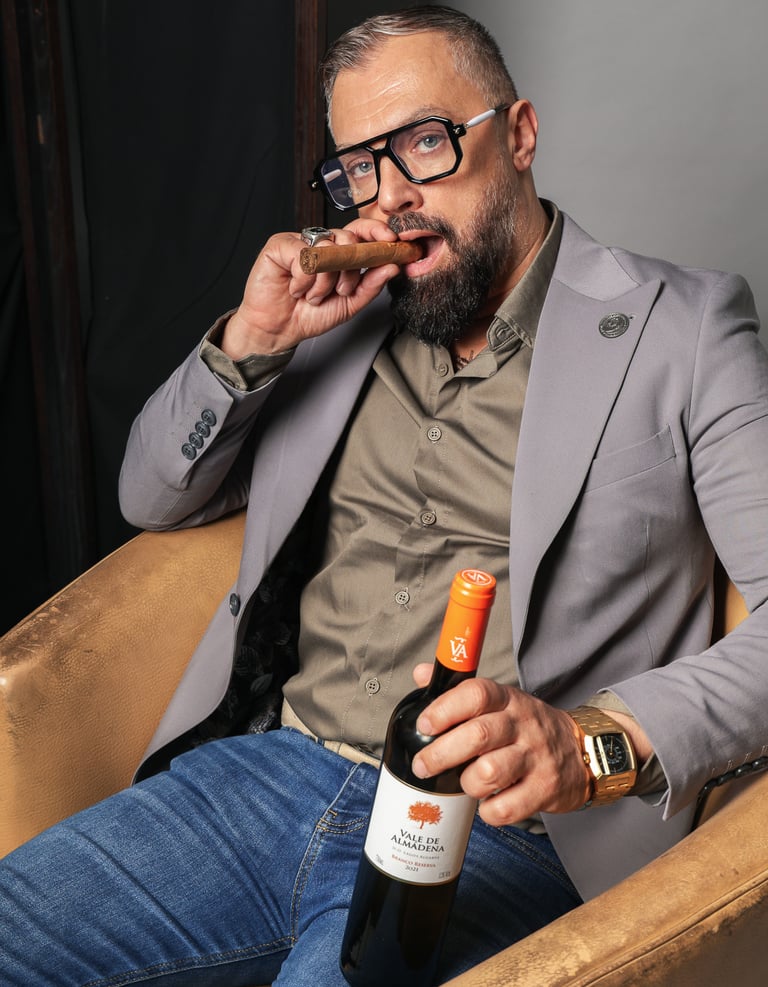

"Borrowed Time" is a significant project in your career, involving collaboration with several Hollywood actors. Can you share some memorable moments or challenges you faced while working on this trilogy?
The first time I worked with Eric Roberts, it was magical but also impressive because his charisma is powerful. I felt that this first installment would give birth to a trilogy that could later become a series. Bob Wall was impressed by my tenacity and determination. I experienced a lot of stress but also a lot of pleasure making this saga. Working with Matthias Hues was a dream come true. I had seen "Dark Angel" and "Kickboxer 2" multiple times and knew that one day I would be in a film with him. Playing with Costas and Louis Mandylor was also a great moment.
Winning multiple awards at international film festivals is a testament to your talent. How do these accolades impact your career, and what do they mean to you personally?
It certainly gives credibility. But it challenges me even more to do better with each film. Each project is a new challenge.
In addition to acting, you have taken on roles as a director and producer. How do you balance these different responsibilities, and which role do you find most fulfilling?
Being an actor is great, but being a director allows for a broader vision of overall creativity. In "The Last Nosferatu," playing the vampire was an intense experience. I truly saw that I had delivered a great performance by playing this bloodthirsty monster with an animalistic body language.Your recent work in "The Last Nosferatu" and "Shepherd Code" has garnered attention. Can you tell us more about these projects and what drew you to them?
"The Last Nosferatu" is a logical continuation of my cinematic desires, not just action but various styles. I loved seeing my face transformed into a fierce beast. For "Shepherd Code," playing an ex-assassin in full redemption was like the continuation of "Borrowed Time" but in a different genre. I had the opportunity to work with Don "The Dragon" Wilson, which was a great moment for me. I was also fortunate to work with LH Chambat, Michael Morris, and Richard.
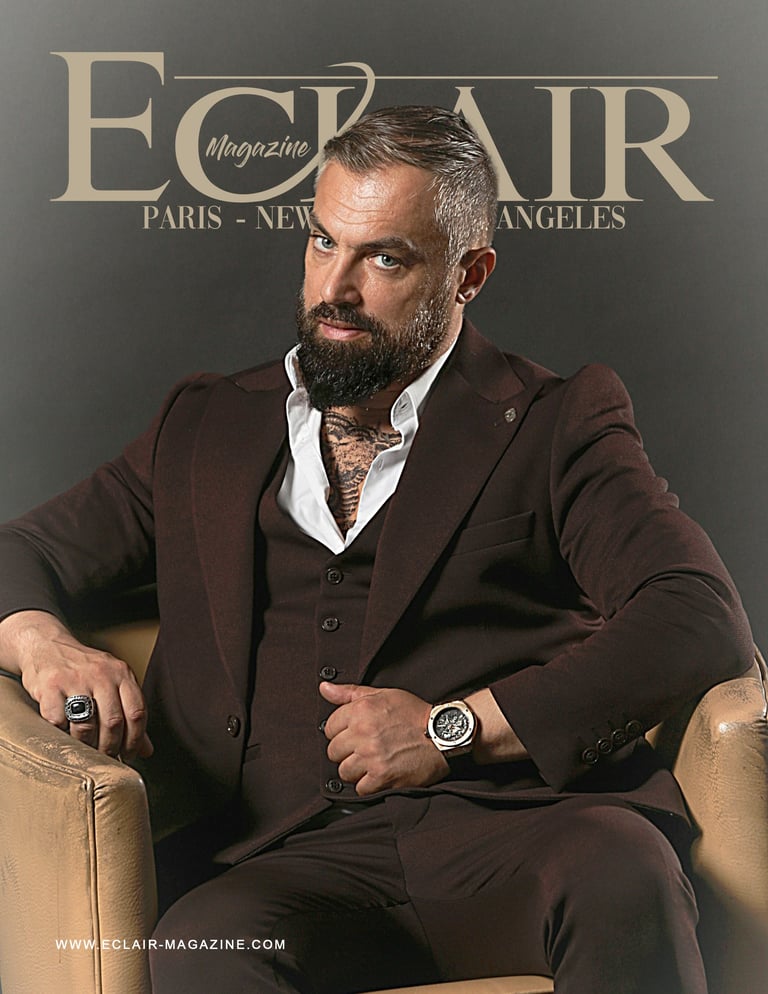

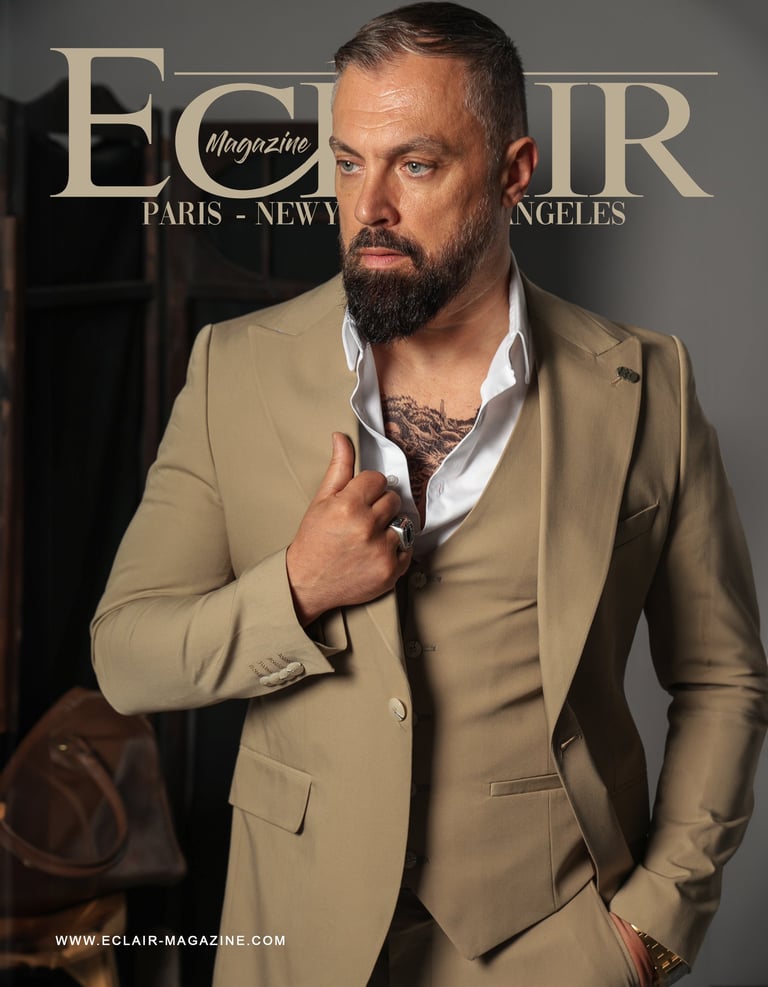

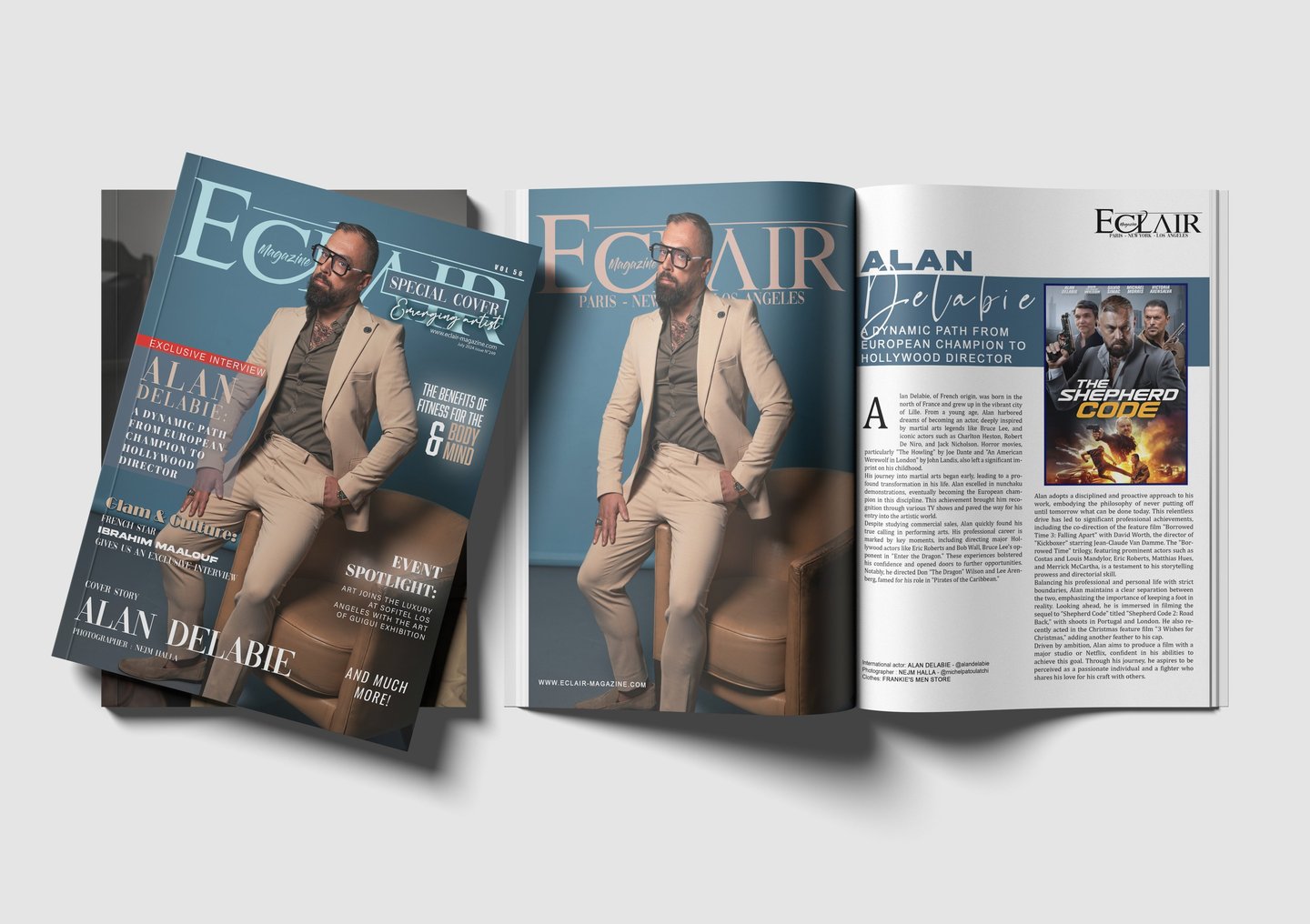

As someone who has been featured on the covers of various magazines and has received media attention, how do you handle the public's expectations and maintain your personal authenticity?
It is important for an artist to be discovered and become mainstream. But independent cinema is true creativity. While studios provide extreme notoriety, I remain simple. I know that nothing is guaranteed in life and that the path can break. One must stay true to oneself and give sincerity to the public. I try to give my best to my audience and will be able to show my grandchildren the magazines and films when I'm very old.
Looking ahead, what are your long-term goals in the film industry, and how do you plan to continue evolving both as an artist and a professional?
First, stay healthy and creative. Achieve my goals step by step. There are many called, but few chosen. You have to believe. There is no age limit for success. Having work in this field is the most important thing. A star can shine quickly but also disappear quickly. So, stay focused on my path to evolution.
INTERVIEW
Quality, not quantity
We have made quality our habit. It’s not something that we just strive for – we live by this principle every day.
